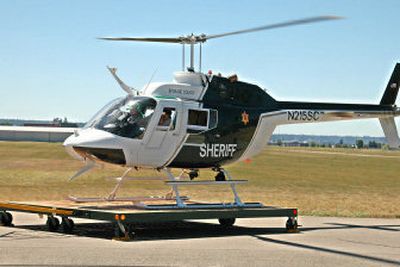Sheriff lukewarm on restored chopper

For the first time in years, the Spokane County Sheriff’s Office soon will have the ability to take flight to enforce drug laws and find lost people.
But Sheriff Ozzie Knezovich is concerned the office’s recently acquired military-surplus helicopter, like past helicopters, will drain financial resources from other public safety needs.
Plans to get a helicopter were made under the administration of former Sheriff Mark Sterk, who retired in March. The new sheriff has grudgingly gone along with the plans.
“There was no way for me to stop the project,” Knezovich said Tuesday. “We’re $500,000 into the project. And at that point, they’d already applied for these grants. At this point, we have to see if we can make this a viable option for us.”
Knezovich said his office originally expected to get the helicopter – a 1970 ex-U.S. Army Bell Scout – for free, but the office had to spend about $500,000 to refurbish the aging machine.
The helicopter had radio problems and other “avionic bugs,” said Capt. Russ Shane.
Pilot training will begin by October, and the helicopter won’t be ready to fly until about a month later, Knezovich said.
The office received enough money from a roughly $150,000 federal law enforcement award to pay for maintenance and operation for one year, starting in October. But Knezovich said his office will have to weigh its priorities if it decides to look for future funding.
The helicopter costs about $250 per hour to fly, and the award application stated the office will fly it for 524 hours during the initial yearlong period, said Esther Larsen, grants and contracts coordinator for the Sheriff’s Office.
Knezovich said the helicopter is slated to be funded purely by grants, and he’s concerned that shrinking federal grants will leave the department unable to support the chopper.
County leaders have repeatedly questioned the expense and insisted it not be paid for with local tax dollars.
Commissioner Phil Harris said he’s concerned that once grant money runs out, sheriff’s officials will be back asking for more.
“We don’t need no stinking helicopter,” said Harris, who flew helicopters in the Air Force. “We’re not Los Angeles.”
If the Sheriff’s Office truly needs an aircraft, it would be better to buy a helicopter developed specifically for police search and rescue missions, Harris said. If one is needed for drug investigations, the Drug Enforcement Agency should be responsible, not the county, he added.
The Sheriff’s Office intermittently used at least two helicopters during the 1970s and ‘80s, but the county’s remaining two helicopters were decommissioned in 1991, according to past reports in The Spokesman-Review. They were cut for budgetary reasons, Knezovich said.
Larsen said the helicopter will be used to find clandestine methamphetamine labs and marijuana fields, patrol transportation corridors and support other agencies, such as the U.S. Secret Service, Drug Enforcement Agency and Department of Natural Resources.
The four-seat helicopter is not armed, but it carries a forward-looking infrared sensor and a searchlight, said Shane.
“It becomes a force multiplier,” he said. “We have so many people out there on the streets, and it just adds to them.”
It will be flown by a pool of six to eight civilian pilots accompanied by sheriff’s deputies who will act as “tactical flight officers,” Shane said.
Those civilians must be trained in shooting in case they are called to back up deputies in an emergency, Knezovich said.
Volunteers are not ideal because it takes time to call them up and warm up the helicopter, Knezovich said.
“It’s going to be kind of a scheduling nightmare to set that up, if you will,” said Shane.
Yet Undersheriff Larry Lindskog, who served under Sterk and was retained by Knezovich, told county commissioners the helicopter will be “a tremendous asset for the whole county.”
“With that kind of investment, what I’ve relayed to the sheriff is, ‘Give it a chance,’ ” Lindskog said.
On Tuesday, county commissioners approved the acceptance of a grant that will pay for helicopter fuel.
Harris said he believes that the high cost of aviation fuel will drive up the per-hour usage cost of running the craft.